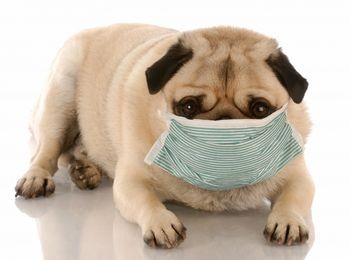Kennel Cough – What you need to know before boarding your dog
 Most people have heard of kennel cough and are aware that it is a contagious upper respiratory disease that can be passed from animal to animal in close contact situations such as a boarding facility. Here are some things you might not realize, however:
Most people have heard of kennel cough and are aware that it is a contagious upper respiratory disease that can be passed from animal to animal in close contact situations such as a boarding facility. Here are some things you might not realize, however:
- Kennel cough is often caused by a complex of infectious viruses, often in combination with the bacteria Bordetella.
- While the kennel cough vaccine protects against Bordetella (and sometimes Parainfluenza virus), there are several other culprits that can be involved. This means that just because your dog is vaccinated does not mean that it cannot develop kennel cough (Although vaccinated dogs often develop a much less serious illness).
- Dogs kept in crowded conditions with poor air circulation are more likely to contract the disease.
- There are two types of kennel cough vaccines- injectable and intranasal.
- The injectable vaccine needs to be boostered 3-4 weeks after the initial dose to be effective. The intranasal vaccine requires at least 4 days in order to provide protection to your pet. This means you should not wait until the last minute to vaccinate your pet.
- Intranasal vaccination can produce a very mild, self-limiting case of kennel cough.
- Kennel cough takes 2-14 days from the time of exposure to the development of clinical signs.
- If your dog is already incubating kennel cough, vaccination will not stop the disease.
- Most cases of kennel cough are not serious and resolve quickly with treatment. Occasionally, though, serious complications can develop. If your pet is not doing better soon after starting treatment, let your veterinarian know immediately.
If you have any questions contact us or reach out to your primary veterinarian.


